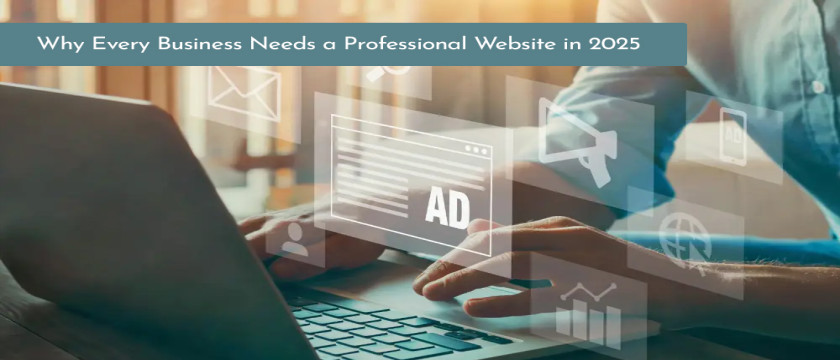Why Every Business Needs a Website in 2025
- home
- Why Every Business Needs a Website in 2025

Why Every Business Needs a Website in 2025
Why Every Business Needs a Website in 2025
Introduction
The world of business has changed dramatically over the past decade, and in 2025, having a website is no longer a luxury—it’s a necessity. With rapid advancements in artificial intelligence (AI), 5G connectivity, and cloud computing, customers expect businesses to be available online, providing information, products, or services with just a click. Whether you’re a small startup or an established enterprise, your website is the digital storefront that defines how potential customers perceive your brand.
The Digital Landscape in 2025
The digital economy in 2025 is fueled by convenience, accessibility, and trust. Consumers are making decisions faster, relying on search engines, voice assistants, and online reviews. Social media remains influential, but it cannot replace the independence and authority of a professional website.
Businesses that fail to establish a solid online presence risk being overshadowed by competitors who embrace digital transformation. Simply put, your website is your passport to visibility in an increasingly competitive marketplace.
Benefits of Having a Website
1. Increased Credibility and Trust
Modern consumers expect every legitimate business to have a website. A well-designed site with testimonials, contact information, and clear offerings reassures customers that your business is trustworthy and professional.
2. 24/7 Accessibility
Unlike physical stores with closing hours, a website works for you around the clock. Customers can browse products, read about your services, or make purchases anytime—even while you sleep.
3. Market Expansion Beyond Local Boundaries
With e-commerce and multilingual features, your website gives you access to a global audience. A small business in Enugu can serve clients in London, New York, or Tokyo with just a few clicks.
4. Improved Brand Visibility
Websites allow you to appear on Google and other search engines, ensuring that customers can find you when searching for products or services you offer.
Key Features of a Successful Business Website
To stand out in 2025, a business website should not just exist but thrive with the right features:
-
Mobile Responsiveness – Most customers browse from smartphones, making mobile optimization critical.
-
SEO (Search Engine Optimization) – To rank high on search engines, your site must be optimized with the right keywords and content.
-
E-commerce & Payments – For businesses selling products or services, integrated payment systems boost convenience.
-
Security Measures – With cyber threats rising, SSL encryption, secure payment gateways, and regular updates are non-negotiable.
The Cost of Not Having a Website
Not having a website in 2025 comes with consequences:
-
You lose customers to competitors with an online presence.
-
You miss opportunities for digital marketing strategies such as SEO, email campaigns, and online ads.
-
Your brand authority suffers, making it harder to establish trust and recognition.
-
Communication with customers becomes limited without tools like live chat, FAQs, or contact forms.
Steps to Building a Business Website
Building a website is easier and more affordable than ever. Here’s how to get started:
-
Choose a Domain & Hosting – Secure a professional domain name and reliable hosting provider.
-
Select a Platform – Use WordPress, Shopify, or other platforms suited to your business needs.
-
Design for User Experience (UX) – Ensure fast loading times, easy navigation, and engaging visuals.
-
Maintain & Update – Regular updates keep your website secure and relevant.
Leveraging Your Website for Growth
A website is more than an online brochure—it’s a growth tool. Businesses can:
-
Use digital marketing (SEO, social media, paid ads) to increase visibility.
-
Implement lead generation tools like email subscriptions and free resources.
-
Track performance with analytics, helping make data-driven decisions.
Future Trends in Business Websites
Looking ahead, websites in 2025 will continue to evolve with:
-
AI & Automation – Smarter chatbots, automated updates, and personalized customer experiences.
-
Voice Search Optimization – As smart assistants grow, businesses must adapt content for voice queries.
-
Blockchain & Cybersecurity – Strengthening customer trust by securing transactions and data.
Conclusion
In 2025, a website is no longer optional—it’s the foundation of business success. From building trust and engaging customers to expanding globally and embracing new technologies, a professional website ensures that your business stays competitive in a digital-first world.
Whether you’re just starting out or looking to scale, the best time to invest in a website is now. After all, in today’s digital marketplace, your website isn’t just part of your business—it is your business.
